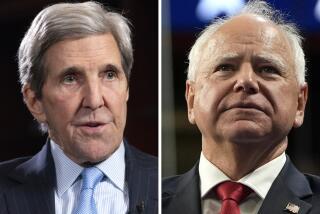Clark’s Hard-Charging Campaign Comes to a Close
- Share via
MEMPHIS, Tenn. — Wesley K. Clark’s late-starting whirlwind of a run for the White House always had the odds against it. Tuesday night, the quest ended when the retired four-star general bowed out of the Democratic presidential race after finishing third in Tennessee and Virginia.
Clark, who had never run for public office, in a relatively short time built a nearly nationwide campaign and -- during the last three months of 2003 -- raised more money than any other candidate except former Vermont Gov. Howard Dean.
Clark’s campaign was bedeviled by rookie mistakes and organizational problems. But his main trouble probably was more basic -- most voters simply didn’t know much about the man who served as supreme allied commander of NATO.
Given that, Clark was in no position to stem the head of steam generated by Sen. John F. Kerry when he won the Iowa caucuses and New Hampshire primary last month.
“There was enormous momentum for John Kerry.... The mountain got too steep to climb,” Clark communications director Matt Bennett said in announcing the 34-year Army veteran’s decision to leave the race.
Clark will formally announce his departure today from his hometown of Little Rock, Ark., Bennett said.
He will support the party’s nominee and other Democratic candidates, a senior campaign official said, and will campaign for others in Southern states where his credentials as a veteran and experience in national security could prove helpful.
Clark entered the race Sept. 17, lured in large part by a movement of some 70,000 people who had sought to “draft” him into the contest.
His nascent campaign quickly decided it could not organize or raise money quickly enough to compete in the Jan. 19 Iowa caucuses. Instead, Clark spent nearly the entire month of January in New Hampshire, his only rival for media coverage most of the time being Connecticut Sen. Joe Lieberman.
Clark’s strategy was to do well enough in New Hampshire to win several of the seven contests on Feb. 3. But he won only one -- Oklahoma.
Kerry, meanwhile, had captured the Iowa caucuses by a strong margin and then won New Hampshire. Clark had struggled to stay in the hunt ever since.
Clark spent more on television advertisements than any of his rivals, but walked away with little to show for it.
He spent more than $10 million on broadcast advertising in major television markets, according to the independent monitor TNSMI/Campaign Media Analysis Group, based in Virginia. The figures include money spent last year and this year through Saturday.
Dean spent $9.7 million, ranking second, and Kerry spent $7.2 million for third.
Nine dollars of every $10 Clark spent on TV ads went to states he did not win. He spent more than any of his rivals in Arizona ($2.5 million), South Carolina ($1.1 million), Tennessee ($1 million) and Virginia ($1.2 million). He also spent more, through Saturday, than anybody else had in Wisconsin ($530,000).
Only in Oklahoma did Clark’s investment of about $970,000 pay off with a win, on Feb. 3.
Clark also struggled with his message. He had several themes that many observers considered strong, the first being his criticism of President Bush for going to war in Iraq. In making his argument, Clark frequently played on credentials earned helping broker peace in the Balkans in the mid-1990s and conducting the 78-day bombing campaign that ended Serbian dictator Slobodan Milosevic’s rampage in Kosovo. “I’ve forgotten more about national security than George W. Bush will ever learn,” he took to saying.
His second theme was a reworking of the term “family values,” a phrase he accused Republicans of employing as a wedge issue, dividing traditional nuclear families from less traditional ones. Family values, he told hundreds of audiences, should be about “what it takes to support and maintain a family,” including employment and healthcare, as well as inclusion and taking care of the environment.
“I think it’s time for an America where we don’t just talk about family values but we actually value families,” he told a crowd of about 200 at a downtown Memphis hotel as results came in Tuesday night but before he had made up his mind to bow out, aides said. “It’s time we had an America where those who have more reach out and help those who have less,” he said.
Campaigning, however, especially in primary contests, is a black-and-white art form in which contenders do their best to highlight certain parts of their records and biographies while shading others, and seek to avoid the complex hues that mark any life, any public record.
With a military career that had gone largely unexamined and, having never voted on a bill or signed a nonmilitary executive order, Clark enjoyed not having to explain some positions but also suffered because he had no easily accessible record to back up the positions he put forth.
He’s a Washington outsider, “just an old soldier from Arkansas,” he liked to say.
Clark made less than $50,000 a year for most of his career, he frequently told audiences, without mentioning that as a four-star general he lived in a mansion and had personal drivers and cooks, or that he earned more than $4 million after retiring from the Army in 2000, in large part by working his military connections.
Clark announced his candidacy for the Democratic nomination two weeks before he registered as a Democrat, having been registered as “unaffiliated.” He voted more times for Republicans in presidential contests than for Democrats -- two biographic items that grated on many party stalwarts.
His relatively brief run seems likely to influence the Democratic nominee in the general election contest against Bush. Other candidates have taken up his attempt to reclaim family values for Democrats. And although Dean built his candidacy around his opposition to the war in Iraq, Clark, who was shot four times as a young captain in Vietnam and rose to the highest rank in the Army, brought a different kind of legitimacy to the antiwar movement.
“I don’t know that he ever developed that connection with voters,” said Vanderbilt University political scientist Bruce Oppenheimer. “But being a military person, he lent credence to the criticisms the other candidates were leveling about the war in Iraq.”
More to Read
Get the L.A. Times Politics newsletter
Deeply reported insights into legislation, politics and policy from Sacramento, Washington and beyond. In your inbox twice per week.
You may occasionally receive promotional content from the Los Angeles Times.










